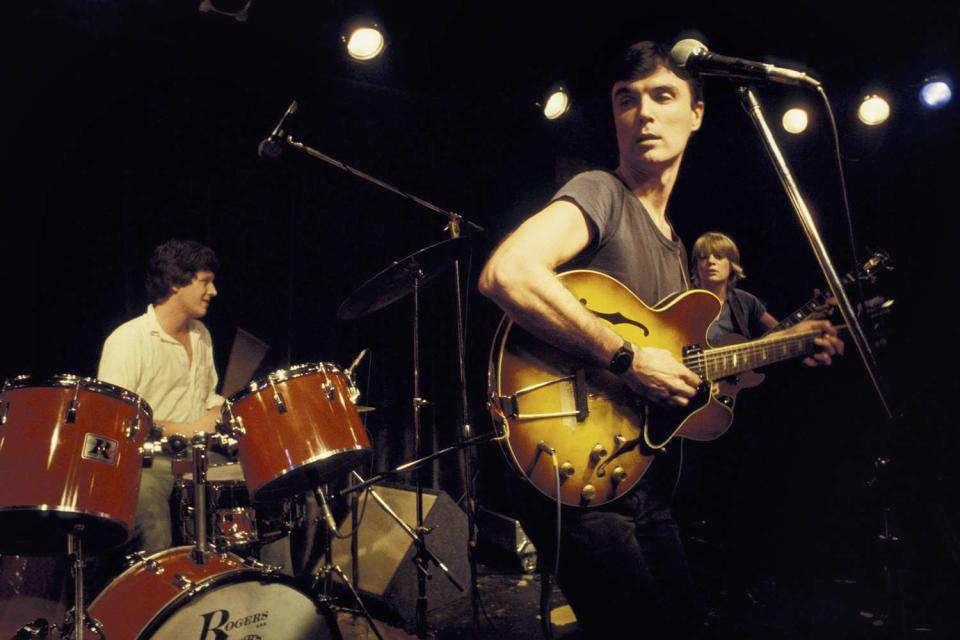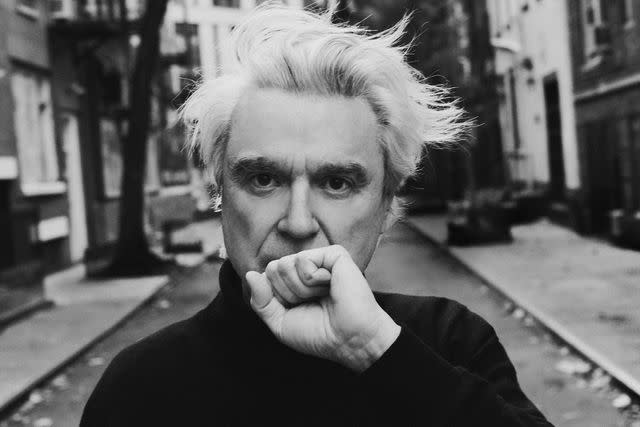David Byrne Says He 'Regrets' How He Handled Talking Heads Breakup and Reveals Where Band Stands Now (Exclusive)
The musician also talks to PEOPLE in this week's issue about his disco opera Here Lies Love, which debuted on Broadway last month

Richard E. Aaron/Redferns
David Byrne, Chris Frantz (drums) and Tina Weymouth (bass) from Talking Heads perform live on stage in New York in 1977David Byrne knows that the Talking Heads’ breakup could have gone smoother.
The musician, who is currently marking the premiere of his musical Here Lies Love on Broadway, opens up to PEOPLE in this week’s issue about the band’s acrimonious end — and how more than 30 years on, he regrets the ways in which he handled things.
“As a younger person, I was not as pleasant to be around. When I was working on some Talking Heads shows, I was more of a little tyrant,” he says. “And then I learned to relax, and I also learned that collaborating with people, both sides get more if there’s a good relationship instead of me telling everybody what to do.”
He continues: “I think [the end] wasn’t handled well. It was kind of ugly.”
Byrne, 71, cofounded the seminal new wave band in the early 1970s with drummer Chris Frantz, and later bassist Tina Weymouth (who is married to Frantz) and keyboardist and guitarist Jerry Harrison.
The group released eight albums together, rising to fame on the back of hits like “Burning Down the House” and on Byrne’s electrifyingly eccentric stage presence. By 1988, though, Talking Heads was done putting out new music, and Frantz told the Los Angeles Times in 1992 that Byrne had “just decided to leave” without discussion, leaving the other groups members shocked and upset.
Reflecting on it now, Byrne — who has played with his bandmates just once since then, at their 2002 Rock & Roll Hall of Fame induction — acknowledges that “divorces can be ugly,” even with the best intentions.
Related: The Yin-Yang of David Byrne: How the Unease of 'American Utopia' Gave Him 'Reasons to Be Cheerful'
“I have regrets on how that was handled. I don’t think I did it in the best way, but I think it was kind of inevitable that would happen anyway,” he says. “We have a cordial relationship now. We’re sort of in touch, but we don’t hang out together.”
Despite its members’ shaky relations, Talking Heads is poised to make a pop culture comeback next month with the re-release of Stop Making Sense, the band’s iconic 1984 concert film.
A remastered version of the documentary — which famously features Byrne in an absurdly large suit — will be released in IMAX on Sept. 22, and hit theaters everywhere on Sept. 29 courtesy of the hip indie production company A24.
“My voice is still in good shape, but there’s one backwards jump that I do, and I go, ‘How in the world did you do that?’” the star says of watching the film back now. “[But] I’m curious. I’m hopeful that a wider, kind of younger audience will get to see this and see what we’ve done. I’m optimistic that it’s going to reach a different audience that wasn’t aware of a lot of this stuff.”

Shervin Lainez
David Byrne in 2020For Byrne, the steady stream of projects that he continues to pursue into his 70s keeps him occupied — and happy.
“I think I’d be bored,” he says of retirement. “I can’t pretend I haven’t been lucky in a lot of these opportunities, but I also always want to challenge myself and do something that I haven’t done before. And sometimes those leaps require an act of faith, but I think it really pays off.”
His latest leap of faith is, of course, Here Lies Love, the disco opera about former Filipino First Lady Imelda Marcos that he first began work on more than 10 years ago with Fatboy Slim.
Byrne says the idea first began percolating years ago, when he’d occasionally attend big discos with singers like Gloria Gaynor and Freda Payne singing with a backing track, almost like a karaoke set.
“The DJs saw their evening as being like an arc, where they’d get the audience excited and bring them back down again, then get them excited again. I thought, ‘What if that arc in a dance club was also telling a story?’” he says. “I filed that away, and then years later, I read that the former First Lady of the Philippines, who was this bigger-than-life figure, loved going to discos. I thought, ‘Wow, she lives in that dance-music disco bubble. Maybe that’s a metaphor for how it feels when you’re in a position of power. I wonder if that’s a story that could be told the way I imagined the audience on a dance floor.’”
Byrne says he didn’t know much about Marcos, whose husband Ferdinand Marcos ruled the Philippines under martial law in the 1970s and early ‘80s, and who was famously said to have 3,000 pairs of shoes.
But as he researched more about her, he quickly came to realize she’d be the perfect subject for the disco opera he’d had in mind for years. With the help of Fatboy Slim, he set out to writing, lifting many of his lyrics from things Marcos actually said.
The show premiered off-Broadway at the Public Theater in 2013, and finally made its Broadway debut in July.
“Last night there was a very large Filipino community group who came to Here Lies Love, and they reacted to things that nobody else even noticed in the songs,” he says. “That made me very happy… Seeing the show with an audience has been a very emotional experience for me.”
For more on David Byrne, pick up the latest issue of PEOPLE, on newsstands everywhere Friday.
For more People news, make sure to sign up for our newsletter!
Read the original article on People.


